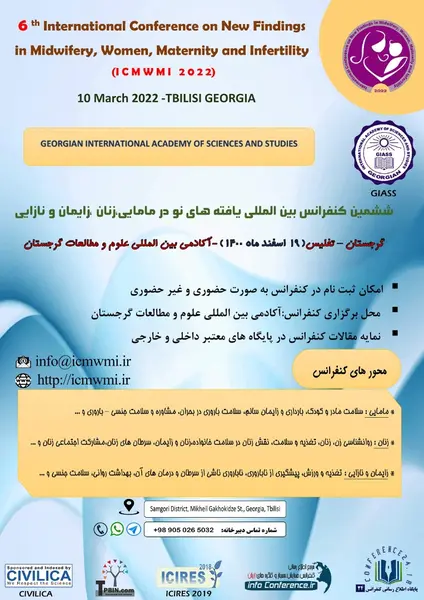-
immunopathogenesis of endometriosis; an overview of the role of innate and adaptive immune cells and their mediators
جزئیات بیشتر مقاله- تاریخ ارائه: 1400/10/15
- تاریخ انتشار در تی پی بین: 1400/12/22
- تعداد بازدید: 132
- تعداد پرسش و پاسخ ها: 0
- شماره تماس دبیرخانه رویداد: 09050265032
immunopathogenesis of endometriosis; an overview of the role of innate and adaptive immune cells and their mediators
endometriosis is a chronic inflammatory disease associated with the growth and proliferation of endometrial-like tissues outside the uterus. although the exact etiology and mechanism of the pathogenesis of the disease have not been fully elucidated, the immune system cells and the mediators produced by them can be named as effective factors in the onset and progression of the disease. abundant production of inflammatory mediators by neutrophils and macrophages and reduced cytotoxicity of defined cells promote endometriosis at the early stages of the disease.
following an increase in the inflammation of the environment, the body takes compensatory mechanisms to reduce inflammation and establish homeostasis. for this purpose, the body produces remodeling and anti-inflammatory factors leading to slow conversion of the inflammatory environment into a non-inflammatory environment with proliferative and immunosuppressive properties.
environmental conditions induce m2 macrophages, th2 cells, and tregs differentiation, promoting disease progression by producing angiogenic and immunosuppressive factors. however, the exact molecular mechanism involved in changing inflammatory to non-inflammatory conditions is not yet fully understood. in this study, we attempted to review studies on the role of the immune system in endometriosis to better understand the pathogenesis of endometriosis.
حوزه های تحت پوشش رویداد
مقالات جدیدترین رویدادها
-
استفاده از تحلیل اهمیت-عملکرد در ارائه الگوی مدیریت خلاقیت سازمانی و ارائه راهکار جهت بهبود
-
بررسی تاثیر ارزش وجوه نقد مازاد بر ساختار سرمایه شرکت های پذیرفته شده در بورس اوراق بهادار تهران
-
بررسی تأثیر سطح افشای ریسک بر قرارداد بدهی شرکت های پذیرفته شده در بورس اوراق بهادار تهران
-
بررسی تأثیر رتبه بندی اعتباری مبتنی بر مدل امتیاز بازار نوظهور بر نقد شوندگی سهام با تأکید بر خصوصی سازی شرکت ها
-
تأثیر آمیخته بازاریابی پوشاک ایرانی بر تصویر ذهنی مشتری پوشاک ایرانی (هاکوپیان)
-
بهبود کارایی سیستم های پردازشی ترکیبی: مورد مطالعه الگوریتم های جبر خطی
-
کنترل بهینه بسامد قطع هماهنگ های مرتبه بالا و تولید پالس آتوثانیه با استفاده از میدان لیزری دورنگی چیرپ شده
-
بررسی تاثیر ساختار شعله و مکانیسم احتراق پیشرانه های جامد بر نانو ذرات فلزی
-
مشارکت بادبند در کاهش تقاضای لرزه ای تیر پیوند در قاب های ebf
-
failure prediction of dp600 steel during cross-die test
مقالات جدیدترین ژورنال ها
-
مدیریت و بررسی افسردگی دانش آموزان دختر مقطع متوسطه دوم در دروان کرونا در شهرستان دزفول
-
مدیریت و بررسی خرد سیاسی در اندیشه ی فردوسی در ادب ایران
-
واکاوی و مدیریت توصیفی قلمدان(جاکلیدی)ضریح در موزه آستان قدس رضوی
-
بررسی تاثیر خلاقیت، دانش و انگیزه کارکنان بر پیشنهادات نوآورانه کارکنان ( مورد مطالعه: هتل های 3 و 4 ستاره استان کرمان)
-
بررسی تاثیر کیفیت سیستم های اطلاعاتی بر تصمیم گیری موفق در شرکتهای تولیدی استان اصفهان (مورد مطالعه: مدیران شرکتهای تولیدی استان اصفهان)
-
بررسی تاثیر مسئولیت اجتماعی شرکت ها بر رفتار مصرف کنندگان
-
اثر قبض در عقود در ایران با تطبیق به فقه امامیه و حقوق کامن لا
-
بازنمایی پوشاک دوره ساسانی، بر اساس مقایسه تطبیقی نقوش برجسته و ظروف
-
بررسی نقش مدیریت منابع انسانی پویا در ارتقاء بهره وری و عملکرد کارکنان شرکت آپاداناسرام
-
تاثیر سیستم اطلاعات مدیریت برمقابله با فساد اداری (مورد مطالعه : شهرداری منطقه 21)




سوال خود را در مورد این مقاله مطرح نمایید :